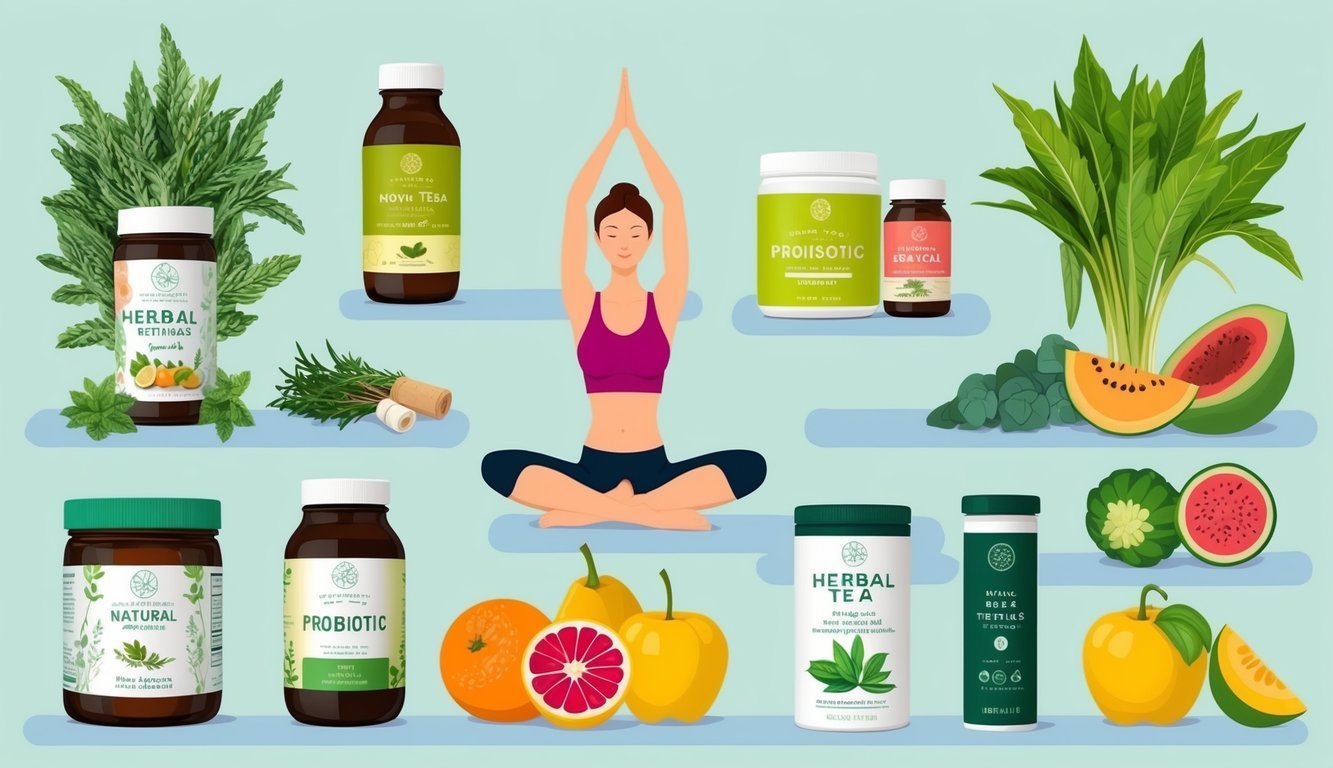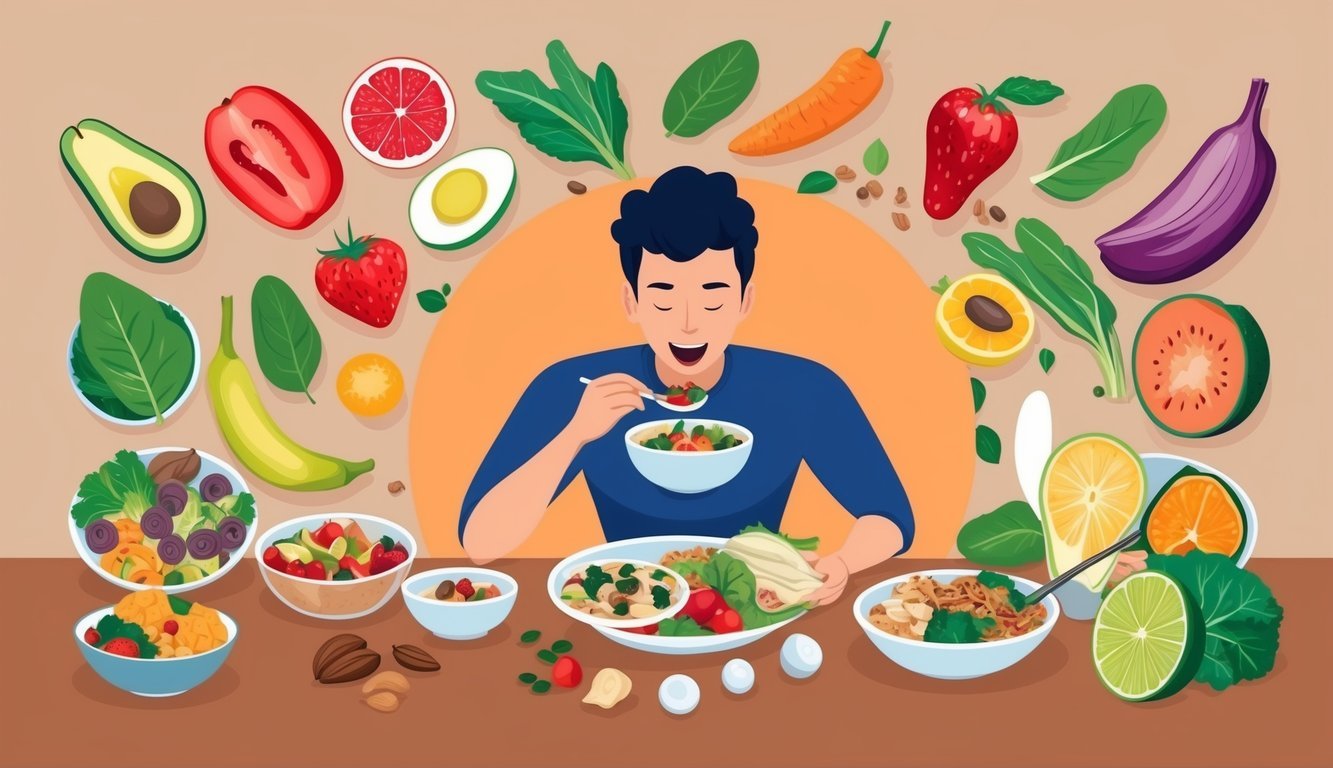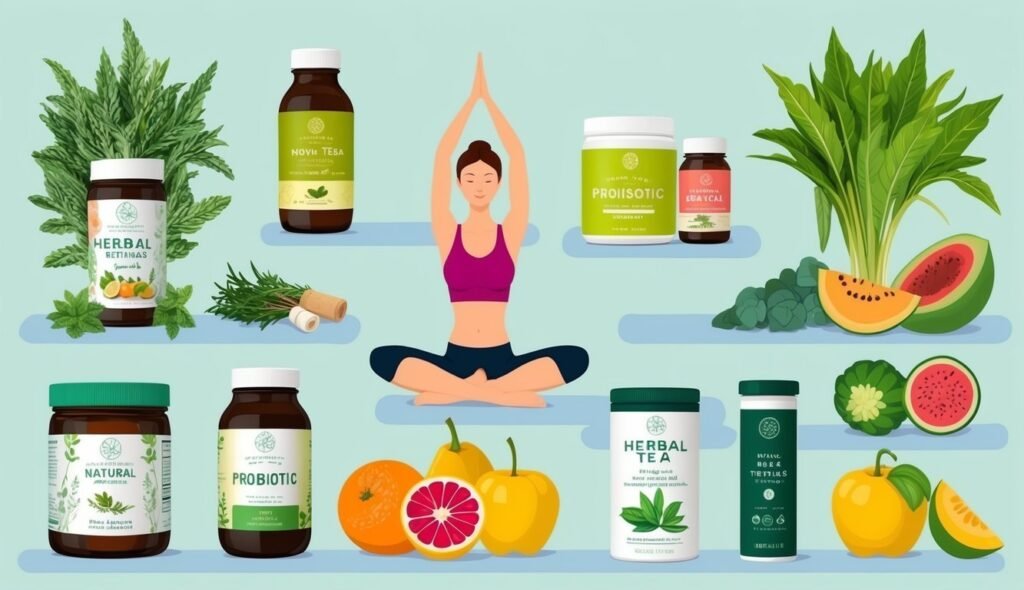Bloating can be an uncomfortable and frustrating experience that many of us face from time to time.
Whether what we eat, how we eat, or even our lifestyle choices cause it, finding effective ways to alleviate it is key.
I’ve discovered some practical techniques that really help reduce bloating and promote better digestion.

Understanding our own bodies and how they react to different foods and habits can make a significant difference.
It’s all about discovering what works for me and learning to listen to my body’s signals.
By adopting some simple strategies, I’ve managed to improve my overall digestion and feel a lot more comfortable.
I started incorporating more fiber-rich foods and probiotics into my diet, which has made a noticeable difference.
Staying hydrated and managing stress have also played key roles in helping me restore gut health naturally.
These small changes have greatly improved my well-being and overall energy levels.
Drink ginger tea
I find ginger tea to be a great choice for tackling bloating and supporting digestion.
This herbal remedy has been used for centuries due to its numerous health benefits.
Ginger contains vitamins and minerals like vitamin C, magnesium, and potassium that are essential for digestive health.
Drinking ginger tea can stimulate the production of saliva, bile, and gastric juices, which helps break down food more effectively.
Whenever I feel bloated or uncomfortable after a meal, I brew a strong ginger tea.
The warmth and spiciness make it soothing and enjoyable.
Additionally, ginger can help reduce inflammation in the digestive tract.
This makes it a practical option for those experiencing gas or discomfort.
I often add a bit of honey or lemon to enhance the flavor and benefits.
Incorporating ginger tea into my routine has made a noticeable difference in how I feel after eating.
It’s a simple, effective way to promote better digestion and reduce bloating.
2) Consume fennel seeds
I’ve found that fennel seeds can be a game changer for digestion.
These tiny seeds have a reputation for helping with issues like gas and bloating.
When I feel uncomfortable, I often chew on a half teaspoon of whole fennel seeds after my meals.
They seem to work wonders in stimulating digestion.
Another way I enjoy them is by making fennel tea.
Steeping one to two teaspoons in boiling water for about 15 minutes creates a soothing drink.
It’s easy to make and tastes nice too.
I also sprinkle ground fennel seeds on salads or yogurt.
Adding them to meals not only enhances flavors but also promotes gut health.
The active compound anethole in fennel seeds can help relax gastrointestinal muscles, helping to ease discomfort.
Regularly incorporating them into my diet has definitely made a difference in how my stomach feels.
3) Try peppermint oil capsules
I’ve found peppermint oil capsules to be quite helpful for reducing bloating.
They work specifically for digestive issues like irritable bowel syndrome (IBS).
Studies suggest that peppermint oil acts as an antispasmodic, helping the muscles in the bowel relax.
This can ease cramping and reduce bloating.
For adults, the typical dosage is 0.2ml to 0.4ml taken three times a day.
Children aged eight and up can take smaller doses.
It’s best to avoid taking them with antacids to ensure effectiveness.
In clinical trials, a significant portion of participants reported less abdominal pain and reduced bloating after using peppermint oil capsules.
Many experienced improvements in stool frequency and stomach discomfort.
I appreciate how easy it is to incorporate this remedy into my routine.
Just a couple of capsules daily can make a noticeable difference.
If you’re looking for a natural approach to boost digestion, peppermint oil capsules are worth considering.
4) Eat Smaller Meals

I’ve found that eating smaller meals can make a significant difference in how I feel throughout the day.
When I pile my plate high, I often end up feeling bloated and uncomfortable.
Smaller portions help my digestive system keep up without feeling overwhelmed.
By spreading meals out, I give my body time to digest before I eat again.
This approach also helps manage hunger levels, so I’m less likely to snack mindlessly.
I try to focus on nutrient-dense foods in these smaller meals.
Incorporating fiber and plenty of vegetables keeps me satisfied without the heaviness.
Snack options like yogurt or fruit can be perfect in between to maintain my energy without overloading my stomach.
Overall, I see great benefits from this method.
Not only do I feel lighter, but my digestion feels much smoother.
Plus, it allows me to enjoy a variety of foods throughout the day without discomfort.
5) Include probiotics

Probiotics have become a popular remedy for digestive issues, including bloating.
I often turn to them when I feel uncomfortable after a meal.
They contain beneficial bacteria that help balance the gut microbiome.
Lactobacillus acidophilus is one strain I frequently see recommended.
It’s known for improving gut health and may help ease bloating.
Another strain, Bifidobacterium bifidum, can also reduce IBS symptoms, making it useful for many people.
I’ve found that incorporating probiotic-rich foods like yogurt and kefir into my diet can make a difference.
These options not only provide probiotics but also taste great.
For those looking for supplements, I like VSL #3.
It has substantial research backing its effectiveness for conditions like IBS.
Probiotics can help shift the balance in the gut, reducing gas and bloating.
Trying probiotics regularly has helped me maintain better digestive health.
They are a simple addition to my routine that can offer noticeable relief.
6) Limit carbonated drinks

I’ve noticed that carbonated drinks can really contribute to bloating.
When I enjoy a fizzy beverage, I tend to swallow air as well.
This extra air can build up in my stomach and make me feel uncomfortable.
The carbonation itself can also affect my stomach’s pH levels, sometimes leading to acid reflux.
That feeling of pressure can be quite unpleasant.
Switching to non-carbonated options has helped me feel lighter.
When I choose water, herbal tea, or juice instead, I often notice less bloating and more comfort.
I try to be mindful about my drink choices, especially during meals.
Avoiding that bubbly sensation has genuinely made a difference in how I feel throughout the day.
7) Exercise regularly

I find that incorporating regular exercise into my routine makes a noticeable difference in my digestion.
When I stay active, my gut seems to move more efficiently.
This helps reduce bloating and promotes overall comfort.
Brisk walking is one of my go-to activities.
Just 30 minutes of walking at a steady pace can really help get things flowing.
It’s simple, effective, and I can do it almost anywhere.
Yoga is another great option that I enjoy.
Specific poses paired with breathing techniques allow me to release tension and improve circulation.
This combination actually supports digestion while also calming my mind.
In my experience, even small amounts of physical activity can be beneficial.
Whether it’s a short stroll, some gentle yoga, or any other preferred exercise, every bit helps.
Keeping my body moving is a key part of feeling good.
Understanding Bloating and Digestion

Bloating can be quite uncomfortable, and it’s often linked to how our digestive system functions.
By exploring what causes bloating and how digestion works, we can better manage this common issue.
Common Causes of Bloating
Bloating results from various factors that lead to excessive gas or discomfort in the abdomen.
Here are some common causes:
- Dietary Choices: Certain foods like beans, lentils, and carbonated drinks can increase gas production. Dairy can also contribute if you’re lactose intolerant.
- Eating Habits: Eating too quickly, talking while eating, or drinking through a straw can cause you to swallow air, worsening bloating.
- Digestive Disorders: Conditions like irritable bowel syndrome (IBS) and celiac disease can trigger bloating and other gastrointestinal issues.
- Hormonal Changes: Women may experience bloating during their menstrual cycle due to hormonal fluctuations.
- Constipation: Not having regular bowel movements can lead to a buildup of gas and bloating.
Identifying personal triggers can help in managing bloating.
Digestion Process Overview
Digestion is the complex process by which our bodies break down food and absorb nutrients.
It can be summarized in the following steps:
-
Ingestion: It all starts when I eat. Chewing is crucial as it breaks food into smaller pieces for easier digestion.
-
Enzymatic Breakdown: Once swallowed, food travels to the stomach where enzymes and acids break it down further.
-
Nutrient Absorption: In the small intestine, nutrients from the food enter the bloodstream. This is where most absorption occurs.
-
Waste Elimination: Finally, what’s left over moves into the large intestine, where water is absorbed, and any remaining waste is prepared for elimination.
Understanding each part of this process helps me recognize how issues can arise and lead to discomfort like bloating.
Lifestyle Changes for Better Digestion

Making a few strategic lifestyle changes can significantly enhance digestion.
Two key areas to focus on are hydration and regular exercise.
These adjustments not only help alleviate bloating but also promote overall digestive health.
The Impact of Hydration
Staying hydrated is one of the simplest ways to support digestion.
Water helps break down food so that nutrients can be absorbed more easily.
It also assists in moving waste through the intestines, preventing constipation.
I aim to drink at least eight glasses of water daily.
Adding a slice of lemon or cucumber can make hydration more enjoyable.
It’s surprising how often I forget to drink enough, especially when I’m busy.
Keeping a water bottle nearby serves as a good reminder.
Additionally, staying hydrated can help reduce bloating.
When I’m dehydrated, my body tends to retain water as a defense mechanism, often leading to that uncomfortable feeling of fullness.
So, filling up on water routinely helps keep things flowing smoothly.
Importance of Regular Exercise
Regular exercise is crucial for maintaining good digestion.
It stimulates the digestive system and promotes effective movement through the intestines.
Even a brisk walk after meals makes a noticeable difference.
Incorporating activities like yoga can also aid digestion.
Certain poses, such as twists and stretches, help alleviate cramps and bloating by encouraging gas to pass through.
Doing these exercises for just 10 minutes often makes me feel much lighter.
Aim for at least 30 minutes of physical activity most days.
Whether it’s walking, cycling, or dancing, it doesn’t have to be intense to be effective.
Making this a regular part of my routine has been a game-changer for my digestive health.

